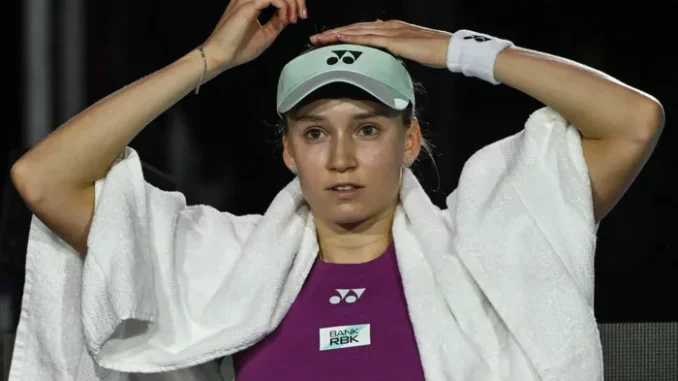
The world of professional tennis has always been a melting pot of drama, emotions, and high-stakes rivalries, but sometimes the intensity extends beyond the court. Elena Rybakina, one of the brightest stars in women’s tennis, has recently found herself in the midst of a coaching controversy that has sparked widespread discussion. The spotlight is now on her relationship with her coach, Stefano Vukov, and the implications it holds for her career. Tennis analysts Andy Roddick and Jon Wertheim have weighed in on the issue, shedding light on the dynamics of their partnership and raising questions about the culture of coaching in the sport.
At the heart of the drama is the claim that Vukov, who has been instrumental in Rybakina’s rise to the top of the WTA rankings, has adopted an aggressive and perhaps overbearing approach in his coaching style. Roddick and Wertheim have referred to this as an “open secret,” suggesting that many within the tennis community have been aware of Vukov’s intense methods for some time. While such a hands-on approach can sometimes yield results, as evidenced by Rybakina’s success, it has also led to concerns about its long-term impact on the player’s mental and emotional well-being.
Rybakina’s journey to stardom has been remarkable. The Kazakh player made headlines with her calm demeanor and powerful game, winning her maiden Grand Slam title at Wimbledon in 2022 and establishing herself as a consistent force on the tour. Her success has been attributed, in part, to the disciplined structure provided by her coaching team, with Vukov playing a central role. However, the very traits that helped her ascend to the top are now being scrutinized as questions arise about whether the pressure and intensity from her coach have crossed the line.
The controversy gained traction after several instances of what appeared to be harsh interactions between Rybakina and Vukov during matches. On-court coaching exchanges, though commonplace in modern tennis, have occasionally revealed tension between the pair, with Vukov’s animated gestures and stern demeanor drawing attention. These moments, captured on camera, have fueled speculation about the nature of their relationship and whether his methods align with the supportive environment players often need to thrive.
Roddick, a former world No. 1 and one of the sport’s most outspoken commentators, didn’t hold back in his assessment of the situation. Speaking during a recent analysis, he pointed out that aggressive coaching styles, while not uncommon, can be a double-edged sword. “There’s a fine line between being demanding and being detrimental,” Roddick remarked. “As a coach, your job is to push your player to their potential, but you also have to know when to pull back and let them breathe.”
Jon Wertheim, a respected journalist and commentator, echoed Roddick’s sentiments but added another layer to the discussion. He emphasized that coaching dynamics in tennis are deeply personal and often complicated. “What works for one player might not work for another,” Wertheim said. “Some players thrive under a drill-sergeant approach, while others need a more nurturing environment. The issue here is whether Rybakina feels supported or if she feels stifled.”
Rybakina herself has largely remained silent on the matter, which has only fueled further speculation. Her quiet and composed nature, both on and off the court, has been one of her defining characteristics. However, this reserved demeanor also means that the public has little insight into her thoughts on the controversy or how she perceives Vukov’s coaching style. While some fans and analysts have called for her to address the issue publicly, others argue that it’s a private matter best handled within her team.
The discussion around Rybakina and Vukov’s relationship has also sparked a broader conversation about the culture of coaching in tennis. Historically, the sport has seen a range of coaching styles, from the nurturing approaches of coaches like Patrick Mouratoglou to the intense, sometimes confrontational methods employed by others. The question of what constitutes effective coaching is far from settled, and the Rybakina-Vukov situation has highlighted the need for clearer boundaries and expectations.
For Rybakina, the timing of this drama is less than ideal. As she continues to compete at the highest level, the added scrutiny on her personal and professional relationships could prove to be a distraction. Maintaining focus on the court while navigating the complexities of her coaching dynamic will be a significant challenge, one that could shape the trajectory of her career in the coming years.
As the tennis world watches closely, many are left wondering what the future holds for Rybakina and Vukov. Will they find a way to resolve their differences and continue their successful partnership, or will this controversy mark the end of their collaboration? More importantly, what lessons can the tennis community learn from this situation to ensure that players receive the support they need to thrive without compromising their well-being?
For now, the spotlight remains on Rybakina. As one of the most talented and promising players on the tour, her ability to navigate this period of uncertainty will be crucial. Whether she chooses to speak out, make changes to her coaching team, or simply focus on her game, her actions in the coming months will likely set the tone for the next phase of her career. Regardless of the outcome, the discussion around her coaching drama has underscored the complexities of professional tennis and the delicate balance between ambition, support, and personal boundaries.
Leave a Reply